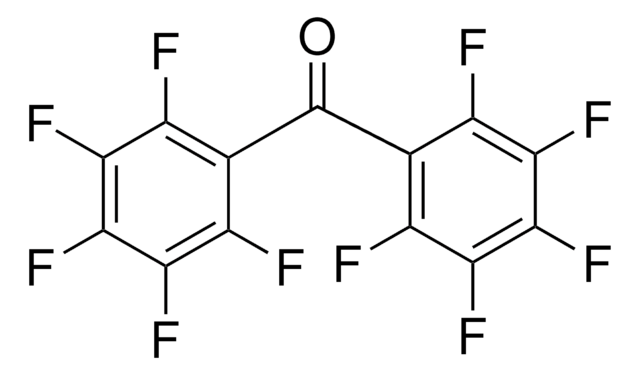104353
Tetrafluoro-1,4-benzoquinone
97%
Synonym(s):
2,3,5,6-Tetrafluoroquinone, Fluoranil, Tetrafluorobenzoquinone
Sign Into View Organizational & Contract Pricing
All Photos(1)
About This Item
Linear Formula:
C6F4(=O)2
CAS Number:
Molecular Weight:
180.06
EC Number:
MDL number:
UNSPSC Code:
12352100
PubChem Substance ID:
NACRES:
NA.22
Recommended Products
Quality Level
Assay
97%
form
solid
mp
183-186 °C (subl.) (lit.)
functional group
fluoro
ketone
SMILES string
FC1=C(F)C(=O)C(F)=C(F)C1=O
InChI
1S/C6F4O2/c7-1-2(8)6(12)4(10)3(9)5(1)11
InChI key
JKLYZOGJWVAIQS-UHFFFAOYSA-N
General description
Tetrafluoro-1,4-benzoquinone is a fluorinated building block, commonly used as a precursor for fluoro derivatives.
Application
Tetrafluoro-1,4-benzoquinone (fluoranil) can be used to prepare:
- Symmetrical or unsymmetrical ethers by coupling of two alcohols via the oxidation-reduction condensation reaction.
- Azocino[4,3-b]indole scaffold, which is used as an inetermediate to prepare (±)-dasycarpidone.
- Chiral and racemic charge-transfer (CT) complexes with binaphthol.
Signal Word
Warning
Hazard Statements
Precautionary Statements
Hazard Classifications
Eye Irrit. 2 - Skin Irrit. 2 - STOT SE 3
Target Organs
Respiratory system
Storage Class Code
11 - Combustible Solids
WGK
WGK 3
Personal Protective Equipment
dust mask type N95 (US), Eyeshields, Gloves
Choose from one of the most recent versions:
Already Own This Product?
Find documentation for the products that you have recently purchased in the Document Library.
Customers Also Viewed
Ken Okamoto et al.
Journal of the American Chemical Society, 125(41), 12416-12417 (2003-10-09)
Self-promoted electron transfer from a cobalt(II) porphyrin [Co(II)OEP] to p-fluoranil (F4Q) occurs, exhibiting a second-order dependence of the electron-transfer rate with respect to the F4Q concentration due to the formation of a strong complex between the dimer radical anion [(F4Q)2*-]
A convenient method for the preparation of symmetrical or unsymmetrical ethers by the coupling of two alcohols via a new type of oxidation-reduction condensation using tetrafluoro-1, 4-benzoquinone.
Shintou T and Mukaiyama T.
Chemistry Letters (Jpn), 11, 984-985 (2003)
Complexation Behavior of Binaphthol/Tetrafluoro-1, 4-benzoquinone Charge-Transfer Complex.
Imai Y, et al.
Crystal Growth & Design, 9(5), 2393-2397 (2009)
Ben-Zhan Zhu et al.
Proceedings of the National Academy of Sciences of the United States of America, 104(45), 17575-17578 (2007-10-31)
We have shown previously that hydroxyl radicals (HO*) can be produced by H2O2 and halogenated quinones, independent of transition metal ions; however, the underlying molecular mechanism is still unclear. In the present study, using the electron spin resonance secondary radical
Tetrafluoro-p-benzoquinone
Essers M and Haufe G
eEROS (Encyclopedia of Reagents for Organic Synthesis) (2001)
Our team of scientists has experience in all areas of research including Life Science, Material Science, Chemical Synthesis, Chromatography, Analytical and many others.
Contact Technical Service












